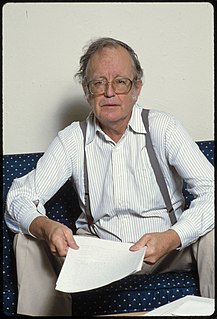A Quote by Wilfrid Sheed
One reason the human race has such a low opinion of itself is that it gets so much of its wisdom from writers.
Related Quotes
We all have within us a deep wisdom, but sometimes we don't know we have it. We live in a culture that doesn't acknowledge or validate human intuition and doesn't encourage us to rely on our intuitive wisdom. Much of the Western world emphasizes rationality and reason, but overlooks or ignores the enormous value of intuition and instinctive wisdom.
Doctor, I had never had anybody like her in my life, she was the fulfillment of my most lascivious adolescent dreams– but marry her, can she be serious? You see, for all her preening and perfumes, she has a very low opinion of herself, and simultaneously– and here is the source of much of our trouble-a ridiculously high opinion of me. And simultaneously, a very low opinion of me! She is one confused Monkey, and, I'm afraid, not too very bright.
The peculiar evil of silencing the expression of an opinion is, that it is robbing the human race; posterity as well as the existing generation; those who dissent from the opinion, still more than those who hold it. If the opinion is right, they are deprived of the opportunity of exchanging error for truth: if wrong, they lose, what is almost as great a benefit, the clearer perception and livelier impression of truth, produced by its collision with error.
It must appear impossible, that theism could, from reasoning, have been the primary religion of human race, and have afterwards, by its corruption, given birth to polytheism and to all the various superstitions of the heathen world. Reason, when obvious, prevents these corruptions: When abstruse, it keeps the principles entirely from the knowledge of the vulgar, who are alone liable to corrupt any principle or opinion.







































